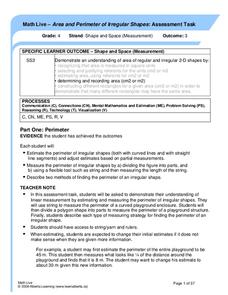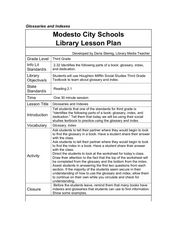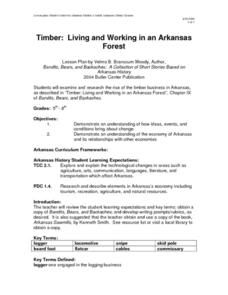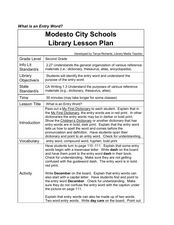Curated OER
Good Drugs, Bad Drugs
Add a science experiment on medicine and drugs to your health lesson. After reading a paragraph on the difference between helpful and harmful drugs, kids choose which pictures of bottles they could find at a pharmacy. The last activity...
Alberta Learning
Area and Perimeter of Irregular Shapes
Evaluate young mathematicians' understanding of area and perimeter with this series of three assessment tasks. Challenging learners to not only calculate the area and perimeter of irregular shapes, but to explain in writing their...
Middle Tennessee State University
The Declaration of Independence: Its Legacy and Ideas in Today’s World
How is it possible that such an old document still triggers modern discussions? Teach scholars why the Declaration of Independence is still so important today using an informative resource. They watch various educational videos, work in...
Facing History and Ourselves
Why Little Things Are Big
Often our decisions are impacted by a fear of how others see us. That's the big idea in a two-day lesson that asks how false assumptions, how our fear of how others may see us, impact how we act. After watching a video about such a...
Facing History and Ourselves
Standing Up to Hatred on Cable Street
The final lessons in this section of the Standing Up for Democracy unit ask class members to consider ways they can help create a "more humane, fair, and compassionate environment" in their communities. For context, learners study how...
Facing History and Ourselves
Defining Freedom
The Emancipation Proclamation freed slaves in the Confederate states. The Thirteenth Amendment banned slavery in the United States. However, neither document defined freedom. The second lesson in the Reconstruction Era series examines...
Facing History and Ourselves
Free Press Makes Democracy Work
A unit study of the importance of a free press in a democracy begins with class members listening to a podcast featuring two journalists, one from a United States public radio station and one from Capetown, South Africa. The lesson plan,...
Facing History and Ourselves
The Legacies of Reconstruction
The final instructional activity in the seven-resource Reconstruction Era collection examines the legacies of Reconstruction. Class members investigate why the period has been called an "unfinished revolution," "a splendid failure," and...
Facing History and Ourselves
Bio-poem: Connecting Identity and Poetry
Writing a bio-poem is a great way to have young scholars go below the surface and reflect on who or what has made them who they are. Check out this richly detailed lesson that provides step-by-step directions for crafting a bio-poem.
Facing History and Ourselves
Mood Meter
Returning to in-class learning has proved to be a challenge for both teachers and learners. This series of 15 lessons provides instructors with ideas about establishing or re-establish classroom protocols and opening or closing routines...
Facing History and Ourselves
Compass Points
Needs, Suggestions, Excitement, and Worries. A Compass Points worksheet asks pupils to give feedback on that day's lesson. Learners identify what they need from the instructor and classmates, what excites them about the class, what...
Facing History and Ourselves
Frame a Special Item
If you could frame something important to you, what would it be, where would you hang it, and why would you choose this particular thing to frame? These questions launch a lesson designed to help class members get to know each other....
Facing History and Ourselves
Teaching Strategy: Contracting
The final lesson in the First Days of School series focuses on how to build a classroom community where all class members can feel safe, heard, and valued. The resource includes step-by-step directions for engaging pupils in developing...
Facing History and Ourselves
Making Meaning of Community
In the post-pandemic classroom, it's more important than ever to begin the school year by building a strong sense of trust and community. Using the Make Meaning and Big Paper teaching techniques, groups develop a definition of community...
Utah Education Network (UEN)
Know Your Literature Genres
Open the library for young readers by introducing them to the main genres and sub-genres. A podcast and two presentations identify the characteristics of the different genres. Groups then sort through a box of books and, using evidence...
Curated OER
Glossaries and Indexes
Fourth graders identify parts of a book including the glossary, index, and dedication. In this glossary and index activity, 4th graders complete a worksheet after studying the glossary and index from a Houghton Mifflin Social Studies...
Curated OER
Step Into the Past: Change and Growth in Arkansas
The concept of change over time is presented in this history lesson. In it, learners discuss how some things stay the same over time, while other things change. Teams of students research and create a timeline of important events that...
Curated OER
Timber: Living and Working in an Arkansas Forest
Upper elementary and middle schoolers examine and research the history of the Timber Industry in the state of Arkansas. An economic component is quite prevalent in this lesson as well. Groups of learners work together to write essays...
Curated OER
My Birthday Connection
Focus on famous women using this lesson. Learners choose a famous woman to research, complete a fact sheet, and discuss their results. While incomplete, this lesson could be used as an outline for a more in-depth exploration.
Curated OER
Are You Sure You've Got the Right Answer?
Young researchers work through the research cycle. They question, plan, gather, sort, synthesize, and evaluate the materials they collect at the library. There are web supplements for this lesson plan.
Curated OER
Sorting
Students examine the concepts of organization and classification. In this library skills lesson, students practice ordering and sorting skills by playing an interactive Internet game. Students then practice their classification skills in...
Curated OER
Dictionary Work - Entry Words
Second graders examine the use of entry words in the dictionary. For this dictionary use lesson, learners look at guide words in a children's dictionary as the teacher/librarian describes the characteristics of each entry. They complete...
Curated OER
Sunburns and Sore Muscles: Working to Save the Farm During the Great Depression
Fifth through eighth graders engage in a lesson in which they study working class people during the Great Depression. They work to develop an understanding of the economic developments in Arkansas during the 1930's. Learners access...
Curated OER
Picturing First Families
Students complete a variety of activities as they study Washington, D.C., the Presidency, and George Washington. They take a virtual trip to Washington, D.C., and visit the National Portrait Gallery, the White House, and the Library of...
Other popular searches
- Fifth Grade Library Lessons
- Library Lessons K 2
- Elementary Library Lessons
- Library Lessons & November
- Kindergarten Library Lessons
- Library Lessons Grade
- Library Lessons for Preps
- Halloween Lessons Library
- Teks Library Lessons
- Library Lessons on Blogs
- Third Grade Library Lessons
- Library Lessons Grade 7

























